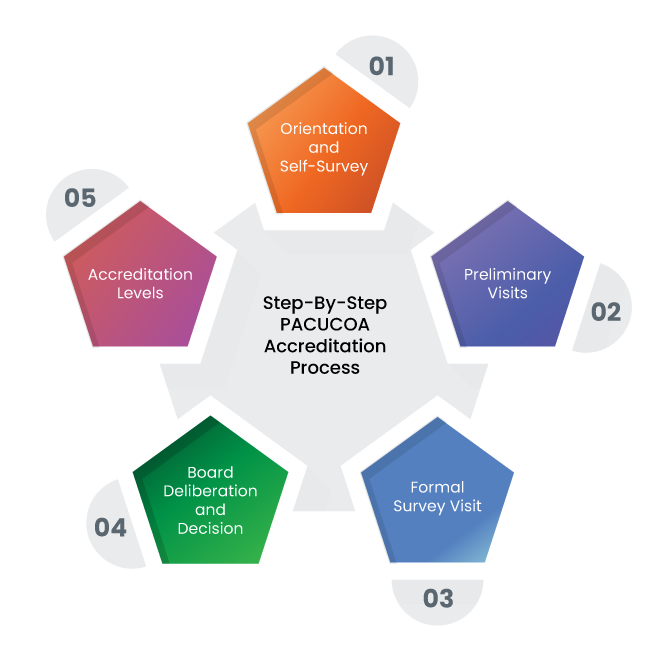Public schools and colleges are responsible for providing foundational knowledge and specialized training to the majority of the Filipino population. On the other hand, private educational institutes play a distinct but crucial role in meeting the specific learning demands of the archipelago.
Private schools and higher educational institutions offer a diverse range of educational philosophies, curricula, and specific programs, such as faith-based, international, and arts-focused programs. Therefore, maintaining high academic standards across the education sector is essential, which is why PACUCOA accreditation has been a significant mechanism for quality assurance and program effectiveness.
But what is PACUCOA, and how does it contribute to the Philippines’ education system? Let’s find out:
Understanding PACUCOA
PACUCOA, or the Philippine Association of Colleges and Universities Commission on Accreditation, is a private, non-profit organization that helps to maintain high standards across the private educational institutions.
The organization fosters a system of continuous improvement and self-assessment across vital areas like curriculum design, faculty qualifications, student support services, and administrative methods.
Besides, PACUCOA, established in 1974, is one of three accrediting agencies under FAAP, which is an umbrella organization that certifies the accreditation status executed by the three member accrediting bodies:
- PAASCU (Philippine Accrediting Association of Schools, Colleges, and Universities)
- PACUCOA (Philippine Association of Colleges and Universities Commission on Accreditation)
- ACSCU-ACI (Association of Christian Schools, Colleges and Universities-Accrediting Council, Inc.)
The Goal of PACUCOA Accreditation
PACUCOA accreditation is a multi-step process that educational institutions undergo to demonstrate adherence to quality standards. The goal of PACUCOA accreditation is as follows:
Identify High-Quality Educational Institutions
The accreditation process aims to officially recognize schools and particular academic programs that meet excellent standards.
Student Guidance
The accreditation acts as a public declaration of the program and the institute’s quality, enabling students and parents to make well-informed decisions about the school or college and whether it meets their needs.
Institutional Improvement
Encourage educational institutions to implement self-evaluation and a commitment to continuous improvement and quality assurance, helping to attain maximum educational effectiveness.
Foster Governmental Benefits
The accreditation process helps institutions establish an educational system and an organizational framework that can serve as the basis for the Commission on Higher Education (CHED) and the Department of Education (DepEd). In effect, they can get various benefits, such as progressive deregulation and incentives.

Step-By-Step PACUCOA Accreditation Process
The extensive accreditation process of PACUCOA has been designed to improve the Philippines’ educational standards and includes several stages, which are as follows:
Orientation and Self-Survey
Institutes eager to complete the accreditation process go through an orientation process, which helps them understand PACUCOA’s philosophy, procedures, and objectives. Next, they conduct a comprehensive self-evaluation of their programs and operations against the accrediting bodies’ criteria.
The outcome of the self-evaluation is a self-survey report, which helps to highlight the institution’s strengths and weaknesses.
Preliminary Visits
The institution submits the self-survey report, and after that, a team of experts from PACUCOA conducts an initial on-site visit. The visit aims to assess an institute’s preparedness for a more in-depth evaluation.
Therefore, the team reviews the self-survey report and supporting documentation, helping to determine whether or not the institute is ready to get to the next stage of evaluation. In case the institute or program demonstrates consistency across all areas, it gets ‘’Candidate Status.’’
Formal Survey Visit
PACUCOA conducts a formal survey visit if the institute undergoes a successful preliminary visit. The formal survey visit entails an extensive on-site evaluation, which lasts several days, wherein the expert team members carry out various activities.
For example, they review exhibits and documents and verify the details and observe classroom teaching activities and laboratory sessions. Interviews with key stakeholders like administrators, staff, faculty, students, and management and inspection of physical infrastructure are instrumental to the visit.
Board Deliberation and Decision
The accrediting team collates a comprehensive report after formal survey visits that reflects the findings and specific recommendations. The team delivers the report to the Board of Directors of PACUCOA, who consider various aspects of the evaluation and make the final decision regarding the accreditation status.
Accreditation Levels
Educational institutes receive an accreditation status, depending on the PACUCOA-set quality standards; various accreditation levels are as follows:
- Candidate Status—Institutions’ programs get the ‘’Candidate Status’’ if they have the capability of getting ‘’Accredited Status’’ within a specific period.
- Level I (Accredited Status)—Educational institutions get initial Level 1 accreditation when their programs meet the established standards.
- Level II (Reaccredited Status)—Programs that have undergone "reaccreditation" and demonstrate continued compliance with quality standards get level II status, which has a longer validity.
- Level III (Reaccredited Status)—This level indicates a higher level of quality, indicating that the program meets the stringent FAAP-set criteria.
- Level IV (Accredited Status)—Institutions/programs that succeed in maintaining excellent educational quality comparable to high-ranking educational institutions receive the highest-level status.
- Institutional Accreditation—PACUCOA grants institutional accreditation to an entire institution that demonstrates top-notch quality across all its areas.
Advantages of PACUCOA Accreditation
Improved Reputation and Credibility
PACUCOA accreditation acts as a public declaration of an institution’s commitment to high-quality education and excellent operations. This provides formal recognition to the institution, enhancing its credibility across prospective students, parents, and the broader community.
In effect, institutions can experience an improved reputation, leading to increased enrollment that may attract talented students. Also, it strengthens the trust and confidence among stakeholders, thereby improving the institution’s position within the educational landscape.
Improved Education Quality
Institutes conduct rigorous self-evaluation and undergo external peer review as part of the accreditation process, enabling them to examine core aspects of their operations. This helps to determine specific areas of improvement in faculty development, curriculum design, student support services, etc.
Universities strive to continuously refine their teaching methodologies and academic programs to meet the set standards. This is crucial in ensuring that students experience effective and relevant learning processes, contributing to their future preparedness.
Increased Student Outcomes
The accreditation process helps to create a high-quality and stimulating learning environment, leading to increased student outcomes. Moreover, programs that comply with PACUCOA standards are more likely to have robust support systems, qualified faculty, and qualified teachers, all of which contribute to students’ academic success.
Besides, graduates from accredited programs perform better, demonstrate high competence, and secure better employment opportunities. In fact, local and international employers and organizations prefer individuals from accredited institutions, as they indicate relevant training and knowledge.
Empowering Philippine Education with Student Information Systems
Autonomy and Deregulation
Institutions that have Levels III and IV statuses get significant benefits related to administrative and academic autonomy. Besides, they can leverage the deregulation from government oversight to make specific decisions in academic offerings, curriculum, tuition fees, etc.
This increased autonomy proves to be vital for educational institutions to adjust according to the evolving industry demands and local and global educational trends.
Access to Funding and Partnerships
Accredited colleges and universities can get better access to funding opportunities, which include grants, subsidies, and development assistance from government agencies and private foundations. As a result, they can invest in their research initiatives, infrastructure development, and teacher training, strengthening institutional capabilities.
What’s more, PACUCOA accreditation improves the institution’s capability to collaborate and partner with other reputable institutions locally and internationally. Therefore, they can work on student exchange programs, research initiatives, etc.
Conclusion
PACUCOA is a significant accrediting organization that has served to elevate the educational standards of the Philippines. It continues to establish stringent standards and carry out a systematic accreditation process that fosters self-evaluation and encourages institutes to adhere to excellent operational and program benchmarks.
Click for a digitally empowered campus
 Author :
Author :
Gaurav Somani,
President Sales